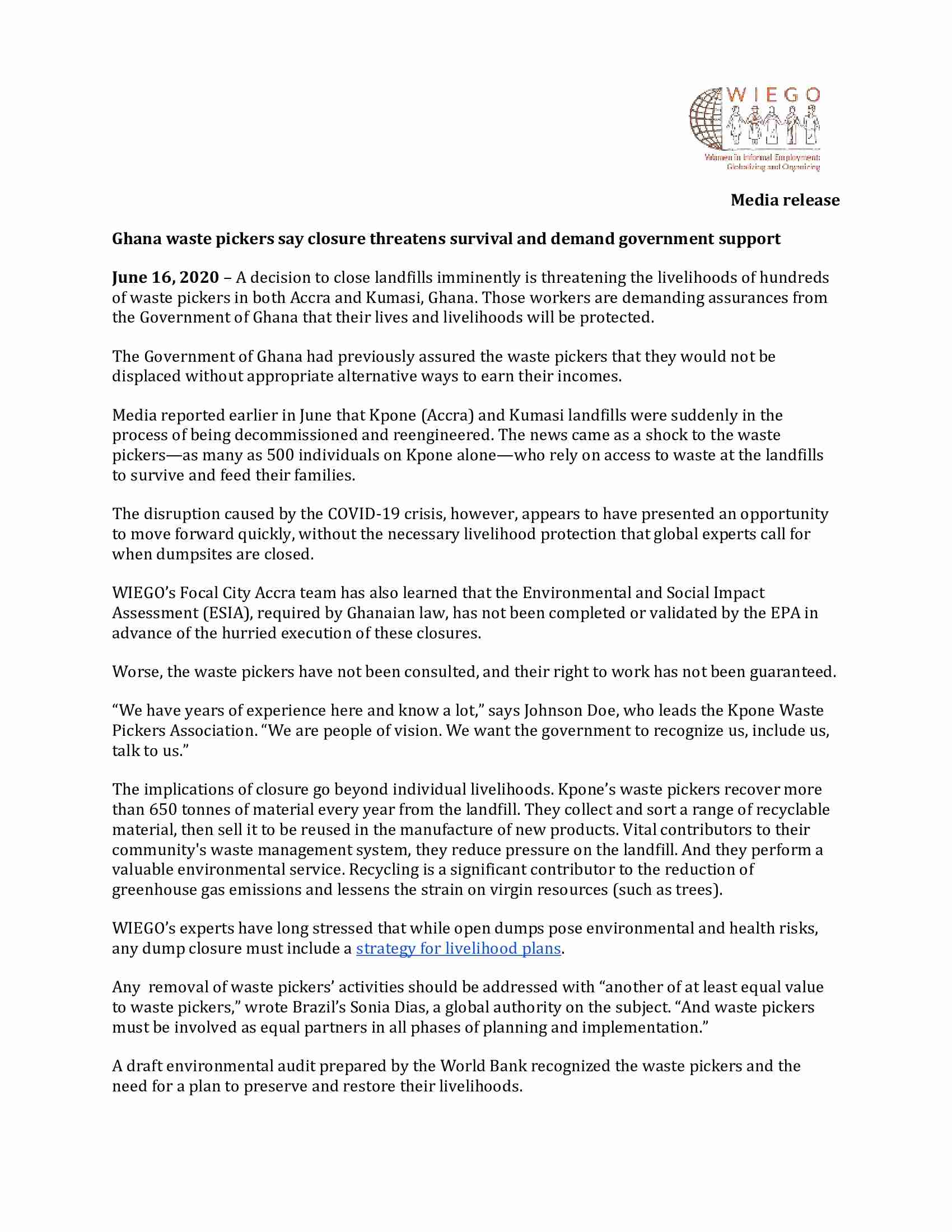June 16, 2020 – A decision to close landfills imminently is threatening the livelihoods of hundreds of waste pickers in both Accra and Kumasi, Ghana. Those workers are demanding assurances from the Government of Ghana that their lives and livelihoods will be protected.
The Government of Ghana had previously assured the waste pickers that they would not be displaced without appropriate alternative ways to earn their incomes.
Media reported earlier in June that Kpone (Accra) and Kumasi landfills were suddenly in the process of being decommissioned and reengineered. The news came as a shock to the waste pickers—as many as 500 individuals on Kpone alone—who rely on access to waste at the landfills to survive and feed their families.
The disruption caused by the COVID-19 crisis, however, appears to have presented an opportunity to move forward quickly, without the necessary livelihood protection that global experts call for when dumpsites are closed.
WIEGO’s Focal City Accra team has also learned that the Environmental and Social Impact Assessment (ESIA), required by Ghanaian law, has not been completed or validated by the EPA in advance of the hurried execution of these closures.
Worse, the waste pickers have not been consulted, and their right to work has not been guaranteed.
“We have years of experience here and know a lot,” says Johnson Doe, who leads the Kpone Waste Pickers Association. “We are people of vision. We want the government to recognize us, include us, talk to us.”
The implications of closure go beyond individual livelihoods. Kpone’s waste pickers recover more than 650 tonnes of material every year from the landfill. They collect and sort a range of recyclable material, then sell it to be reused in the manufacture of new products. Vital contributors to their community's waste management system, they reduce pressure on the landfill. And they perform a valuable environmental service. Recycling is a significant contributor to the reduction of greenhouse gas emissions and lessens the strain on virgin resources (such as trees).
WIEGO’s experts have long stressed that while open dumps pose environmental and health risks, any dump closure must include a strategy for livelihood plans.
Any removal of waste pickers’ activities should be addressed with “another of at least equal value to waste pickers,” wrote Brazil’s Sonia Dias, a global authority on the subject. “And waste pickers must be involved as equal partners in all phases of planning and implementation.”
A draft environmental audit prepared by the World Bank recognized the waste pickers and the need for a plan to preserve and restore their livelihoods.
Ghana has claimed to want to include job creation and social inclusion as part of its waste management policies. The Ghana National Plastic Action Partnership initiative, led by Ministry of Environment, Science Technology and Innovations, calls for “the creation of jobs, especially for the most vulnerable segments of Ghanaian society, and a strong and vibrant integration of the informal sector within the plastics value chain.”
“This landfill closure puts the Plastic Action Partnership to the test,” says Doe. “If they were truly committed to social inclusion, then they would have included the waste pickers and planned for job creation when they shut down the dumps.”
Waste pickers, Doe says, understand both the waste management system and what waste pickers need to survive, thrive and continue to serve their communities.
Waste pickers in Kpone have started scoping alternative livelihood collection in communities, including doorstep collection of recyclables. They want the Government of Ghana to support them to secure waste management contracts, finance and infrastructure to operate as an independent cooperative along the waste value chain.
Doe says too many questions are unanswered, including whether there are plans to construct new landfills, where these would be located and how waste pickers will be included. “We feel we can play a major role in the waste management system,” he says. “We have a lot of ideas.”
Waste pickers at the Kpone and Kumasi landfills demand that their government immediately provide assurances that their right to work will not be disrupted, and their workplaces—the landfills—will remain accessible to them until waste pickers, working with government, have developed appropriate alternative livelihoods.
The Kpone waste pickers also demand that the government be transparent about all current and future plans and processes to close, change or construct landfills, including by disclosing due diligence reports and funding sources.
---
CONTACT for interviews and information:
Karim Saagbul: +233 243314406, karim.saagbul@wiego.orgABOUT WIEGOWomen in Informal Employment: Globalizing and Organizing (WIEGO) is a global network focused on securing livelihoods for the working poor, especially women, in the informal economy. We believe all workers should have equal economic opportunities and rights. WIEGO creates change by building capacity among informal worker organizations, expanding the knowledge base about the informal economy and influencing local, national and international policies. Visit www.wiego.org.
